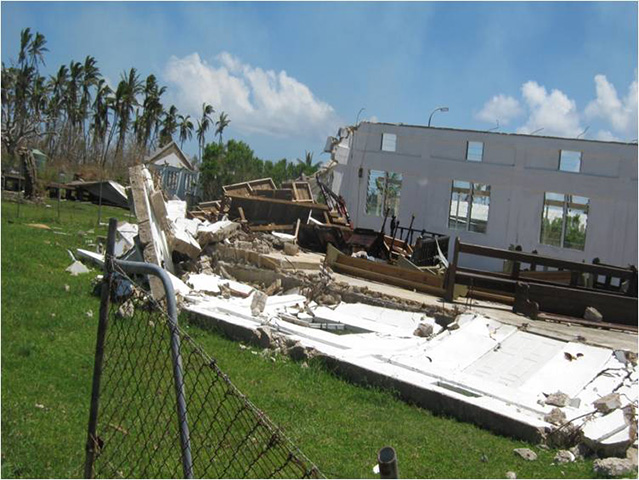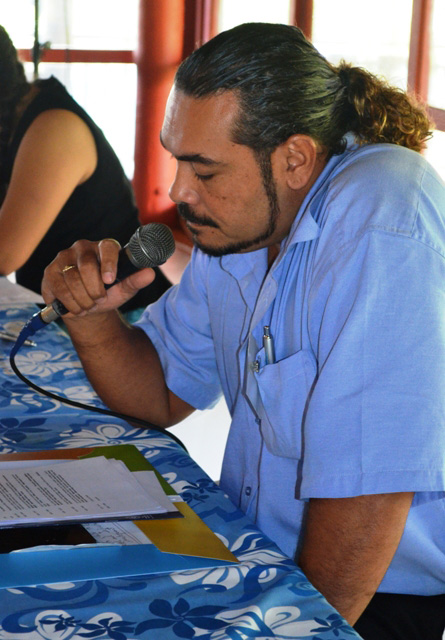
Climate Change Resilience
Meteorological term today: Severe Tropical Cyclone - is one that reaches Categories 4 - 5. Cyclone strength is measured in terms of wind speed. If the sustained wind speed, this is continued wind speed and not the sudden gusts of wind, from 160 km/h to over 200 km/h then they are categorised as Category 4 or 5.
4 April 2014, Rarotonga Cook Islands - Cyclone Ian, a category 5 Tropical Cyclone, passed over Tonga in January this year leaving behind USD 120 million in damages, one fatality and the complete destruction of 564 homes on the island of Ha'apai.

Feedback from communities indicate the Tonga Meteorological Service was successful in sharing climate information, forecasting the cyclone and distributing warnings to residents, however the Tonga Met Service feels that response information needs to be incorporated into the climate and weather forecasts to ensure that communities can respond effectively.
In November last year the Tonga Met Service shared information that Tonga could expect 1 to 2 cyclones of which one may reach or exceed category 3 status or be classified a severe tropical cyclone. In the months following, the TMS carried out awareness work through TV and radio talk back programmes.
Severe Tropical Cyclone Ian passed over a period of six and a half days The Tonga Met Service issued a total of 47 advisories and increased their radio updates and warnings every 15 minutes when the system approached the Ha'apai Group and continued to maintain warnings even when Cyclone Ian moved to Fiji and out of Tonga waters.

"We thought we did well, people said we did well but when we carried out our follow up assessment surveys we found that most people only evacuated their homes when their house either collapsed or when the 'eye' passed over," said Ofa Fa'anunu, Director of the Tonga Meteorological Service.
"Based on this assessment we now need to work on conveying weather, climate, and response information in a manner communities understand. To look at the language used, wherever possible use traditional knowledge and then share the information in an approach that the communities are comfortable with and are able to respond to properly."
There are five main Meteorological Centres in Tonga with 28 staff that service the 170 dispersed islands that make up the Kingdom of Tonga.
The Pacific Climate Services Conference in the Cook Islands this week has been an opportunity for the Tonga Met Service to share their experience and seek support under the Global Framework for Climate Services (GFCS) to help strengthen their communication skills, so come next tropical cyclone season their communities will be better prepared.

"I wanted to stress again the importance of making the impact on the ground with the our communities, often at times we tend to be lost in what we do as a Met Service in data collection, climate forecasting and we miss a very important aspect," said Fa'anunu.
"That information must get to our communities in an accurate, timely manner that is understood."
Pacific meteorological directors, stakeholders and development partners have come together from 31 March to 4 April in the Cook Islands for the Regional Consultation on Climate Services for Pacific Small Island States and Related Meetings. Normal 0 false false false EN-US X-NONE X-NONE MicrosoftInternetExplorer4 Tonga Meteorological Service /* Style Definitions */ table.MsoNormalTable {mso-style-name:"Table Normal"; mso-tstyle-rowband-size:0; mso-tstyle-colband-size:0; mso-style-noshow:yes; mso-style-priority:99; mso-style-qformat:yes; mso-style-parent:""; mso-padding-alt:0in 5.4pt 0in 5.4pt; mso-para-margin:0in; mso-para-margin-bottom:.0001pt; mso-pagination:widow-orphan; font-size:10.0pt; font-family:"Times New Roman","serif";}
4 April 2014, Rarotonga Cook Islands - Cyclone Ian, a category 5 Tropical Cyclone, passed over Tonga in January this year leaving behind USD 120 million in damages, one fatality and the complete destruction of 564 homes on the island of Ha'apai.

Image (c) Tonga Meteorological Service
Feedback from communities indicate the Tonga Meteorological Service was successful in sharing climate information, forecasting the cyclone and distributing warnings to residents, however the Tonga Met Service feels that response information needs to be incorporated into the climate and weather forecasts to ensure that communities can respond effectively.
In November last year the Tonga Met Service shared information that Tonga could expect 1 to 2 cyclones of which one may reach or exceed category 3 status or be classified a severe tropical cyclone. In the months following, the TMS carried out awareness work through TV and radio talk back programmes.
Severe Tropical Cyclone Ian passed over a period of six and a half days The Tonga Met Service issued a total of 47 advisories and increased their radio updates and warnings every 15 minutes when the system approached the Ha'apai Group and continued to maintain warnings even when Cyclone Ian moved to Fiji and out of Tonga waters.

Image (c) Tonga Meteorological Service
"We thought we did well, people said we did well but when we carried out our follow up assessment surveys we found that most people only evacuated their homes when their house either collapsed or when the 'eye' passed over," said Ofa Fa'anunu, Director of the Tonga Meteorological Service.
"Based on this assessment we now need to work on conveying weather, climate, and response information in a manner communities understand. To look at the language used, wherever possible use traditional knowledge and then share the information in an approach that the communities are comfortable with and are able to respond to properly."
There are five main Meteorological Centres in Tonga with 28 staff that service the 170 dispersed islands that make up the Kingdom of Tonga.
The Pacific Climate Services Conference in the Cook Islands this week has been an opportunity for the Tonga Met Service to share their experience and seek support under the Global Framework for Climate Services (GFCS) to help strengthen their communication skills, so come next tropical cyclone season their communities will be better prepared.

Pictured: Ofa Fa'anunu, Director of the Tonga Meteorological Service
"I wanted to stress again the importance of making the impact on the ground with the our communities, often at times we tend to be lost in what we do as a Met Service in data collection, climate forecasting and we miss a very important aspect," said Fa'anunu.
"That information must get to our communities in an accurate, timely manner that is understood."
Pacific meteorological directors, stakeholders and development partners have come together from 31 March to 4 April in the Cook Islands for the Regional Consultation on Climate Services for Pacific Small Island States and Related Meetings. Normal 0 false false false EN-US X-NONE X-NONE MicrosoftInternetExplorer4 Tonga Meteorological Service /* Style Definitions */ table.MsoNormalTable {mso-style-name:"Table Normal"; mso-tstyle-rowband-size:0; mso-tstyle-colband-size:0; mso-style-noshow:yes; mso-style-priority:99; mso-style-qformat:yes; mso-style-parent:""; mso-padding-alt:0in 5.4pt 0in 5.4pt; mso-para-margin:0in; mso-para-margin-bottom:.0001pt; mso-pagination:widow-orphan; font-size:10.0pt; font-family:"Times New Roman","serif";}